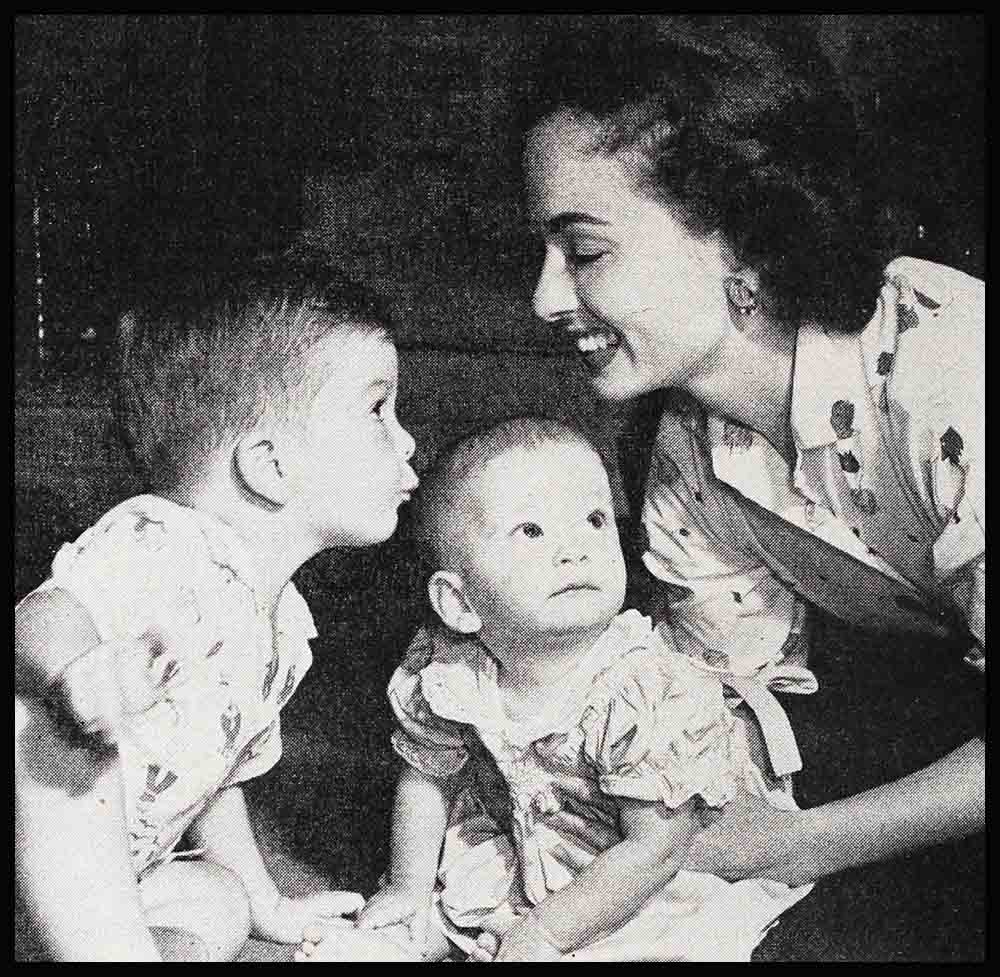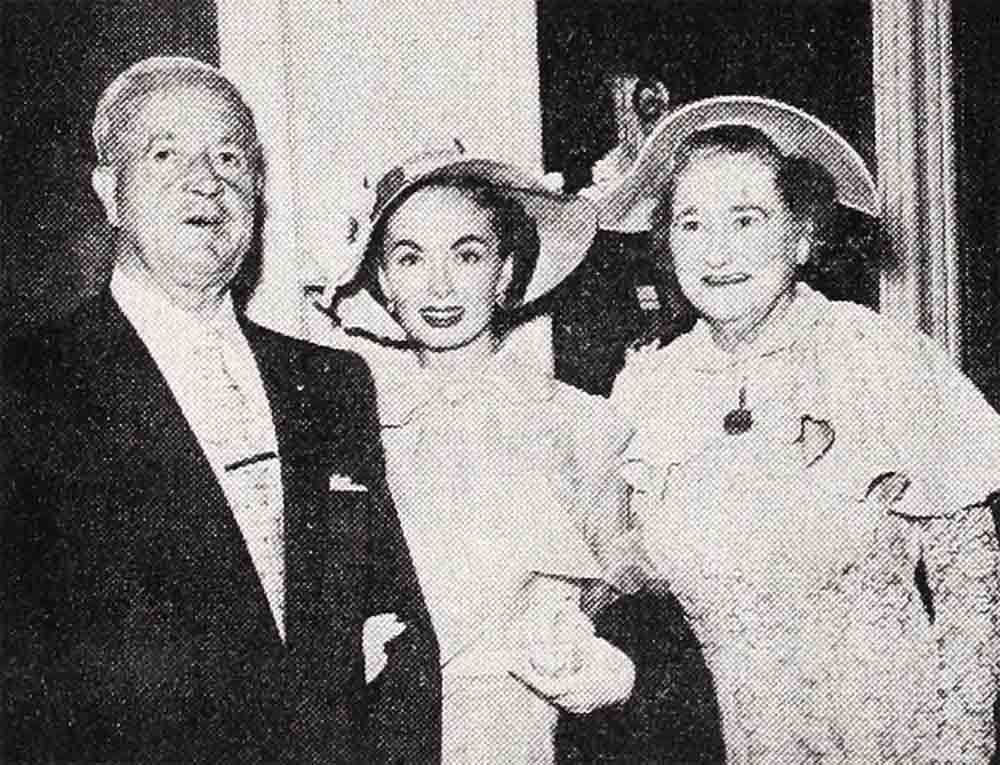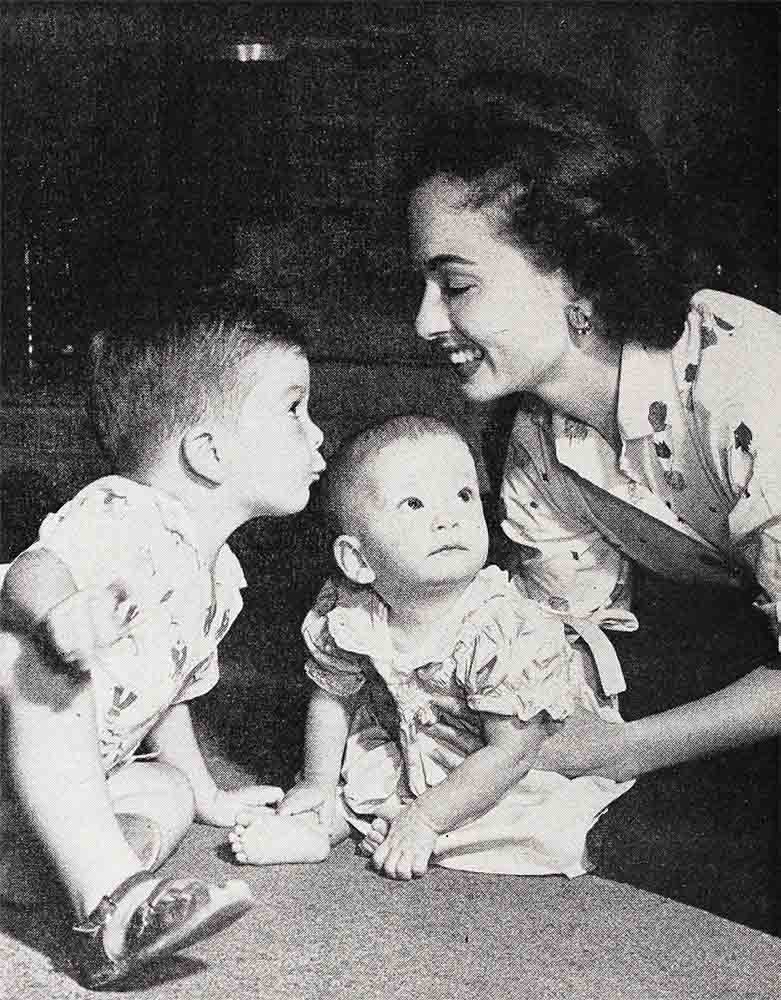
Count Your Blessings
“Timmy is ready to go to sleep, Mrs. McNulty,” said the nurse.
Mrs. McNulty, alias Ann Blyth. excused herself and left the dinner table. She was having fun, but seeing Timmy into his bed and kissing hini good-night was a nightly ritual she wouldn’t miss for the world.
“Good night, Mummy,” the child mumbled. At any rate, the sounds he made were a reasonable facsimile of such words and that’s what Ann interpreted them to mean.
“Good night, sweet dreams and God bless you, my darling,” Ann said, kissing her two-year-old son on the cheek. “Give me another scare like you did this morning, you little rascal, and I’ll tan your hide.”
Despite her words, Ann didn’t even try to look stern.
Timmy had locked himself in his room that morning. She’d been frantic outside the door, imagining all sorts of calamities that might befall him. Forcing herself to be calm, she’d tried a dozen different keys until she found one that fit. When she saw Timmy not only unharmed but delighted with his prank, her relief was so great she merely clasped him in her arms, thanking God that nothing had happened to him. She couldn’t even bring herself to punish him. That was one of the things she wasn’t terribly good at, anyhow.
AUDIO BOOK
After she turned the light out in Timmy’s room she looked in on the baby sleeping peacefully in the adjoining nursery. She was a good baby, Maureen Ann. Full of smiles and gurgles, she hardly ever cried. Ann, of course, was more relaxed with the baby than she’d been with Timmy. Mothers usually are with the second child. If she ran true to McNulty form—and so far she’d been doing nicely indeed—she’d have a chance to get a lot more relaxed before she was through.
She tiptoed out of the room and rejoined her guests at the dinner table. Her cousin, Teresa Lynch, was telling one of her delightful Irish stories, and telling it very well in her wonderful brogue. Ann had heard it before—something about a horse that had been given a pill to make him run faster. Teresa came to the punch line: “Sure an’ you’d better give me one, too. I’ve got to run an’ catch the ould creature.”
The story was a success. Ann smiled, proud of her cousin. Teresa had arrived from Ireland for a visit with Ann only a few weeks before. It was nice to have another blood relative of her own around for a change.

In the midst of a family gathering like the one that night, Ann still had to pinch herself once in awhile to make sure it was really true. She’d always lived in such a small, self-contained world before she married Jim. After both her mother and her sister had passed away, there’d only been her dear Aunt Cissie and Uncle Pat. Now she’d become part of a large, lusty, warm family.
“It’s the most wonderful thing in the world,” Ann says, “especially if it’s a family like the McNultys, who are closely knit and really love each other.”
When you meet Ann Blyth for the first time, you can’t help having a set of certain preconceived notions about her. You probably heard her on the radio when she was a child or maybe you saw her on Broadway in “Watch on the Rhine.” Later, you witnessed her develop from a child singing star into the romantic lead in dozens of movies. You know that she’s beautiful, you’ve heard her golden voice, and you’ve read about the struggles and tragedies of her childhood, her deep religious feeling, her courage and her gentleness. Yet you wonder whether the mental picture you’ve formed of Ann can possibly correspond to the real thing.
After all, Hollywood being what it is, it seems like a miracle that so gentle and self-effacing a girl as Ann Blyth, who has spent most of her formative years in these surroundings, should reach such heights of success and yet retain a spotless reputation as well as achieve a rare degree of marital happiness. But when you meet her face to face, the mystery resolves itself.
Ann, in person, is fully as beautiful as any of her pictures, but what captivates you is her warmth, the calm sincerity of her personality. As a bonus you’ll find that she also has a delightful sense of humor and that she talks well and easily on any number of subjects. You notice a special glow the instant the conversation turns to her children and her family. When I visited with her I wanted to know more about her relationship with the large McNulty clan—“the thundering herd,” as people sometimes jokingly refer to them.
“To be quite honest, I think I was a little scared at first,” she relates. “I was in love with Jim and extremely fond of all his family, but still I figured I had quite an adjustment to make.
“But I needn’t have worried. I couldn’t have picked sweeter in laws even if I could have had them custom-built to my specifications. And, incidentally, no matter what people might say about mothers-in-law in general, Mother McNulty is tops. She’s got the biggest, warmest heart of anybody I know. All her sons’ wives are simply ‘my girls’ to her. Why, she’ll even share her most treasured recipes with us. And she’s got some good ones, too.

“Besides,” Ann continued, “I have special reason to be grateful to her. If it hadn’t been for Mother McNulty, I’m afraid it would have taken Jim a lot longer than it did to ask me to marry him. He’d sought his mother’s advice about some jewelry he wanted to get me for Christmas, and she told him: ‘Jim, there’s only one piece of jewelry you should get for Ann, and that’s a wedding ring.’ He kept it in his pocket for a week before he finally gave it to me a week before Christmas back in 1952. I like to think, of course, that he’d have gotten around to it sooner or later on his own, but I’m glad his mother speeded it up a little.”
All the same, the size of the family Ann acquired when she married her Jim was enough to give pause to any bride, and especially one coming from as small a family as Ann. Besides his mother and father, Jim has four brothers and one sister, all of them married. Among the six of them they have so far produced twenty-one children, ranging in age from two months to twelve years. Jim’s brother, Dennis Day, is in the lead, so far, with six children, followed closely by his sister, Marie, who has five. The race is by no means over, however. Brother Bill, the youngest, who is still in the Army, already has three. Ann, with two in less than three years, certainly is holding up her end of the McNulty tradition.
It’s easy to see that it would require a medium-size hotel to be host to the entire elan at one time. Such occasions, therefore, are fairly rare. The only regularly scheduled events, always drawing large crowds of McNultys, are anniversaries, baptisms and children’s birthdays. Some sixteen cousins plus mothers came to Timmy’s first birthday party.
“Luckily we have a large garden and it hardly ever rains in June,” Ann explains. “That simplifies things a lot. And my sisters-in-law are very helpful. Besides, they certainly have lots of experience.”
Experience or no, there is usually a great deal of noise at these parties, as is to be expected with a gang of blessedly robust, healthy youngsters. However, it isn’t so much less quiet when the grownups get together, though the noise is a lot more harmonious. Take almost any group of people with an Irish background and you have a glee club. Take the McNultys and you really have something. Though Ann and Dennis are the only pros among them, all of them are highly musical. Singing and making music is as natural to them as drawing a breath. Family dinner parties at Ann’s usually start out quietly enough with good food and good talk, but they end up almost invariably with everybody standing around the piano singing old and new songs.

Ann, who likes to cook, always plans and supervises all the meals and frequently takes a hand at cooking them herself. Among her specialties are fried chicken, Irish stew and corned beef, but she doesn’t go overboard on Irish dishes, liking variety and preferring to fit the menu to the occasion.
“Maybe it’s not my place to say so,” Ann smiles, “but I always have a lot of fun at my own parties, not to mention those at Mother McNulty’s, Marie’s or the rest of the boys.
“Somehow the impression seems to have gotten around that I’m something of a plaster saint,” Ann continued. “all the stories I read about myself seem to have that tinge of sadness. I really don’t know why.
“Certainly, it was a terrible blow to me when my mother passed away. But when she was alive, she gave so much of herself that the memory alone would have been enough to fill me with warmth and love for the rest of my life. And I had my aunt and uncle who were always like a second mother and father to me.
“I remember Uncle Pat rigging up signs on the jeep on his farm in Stamford, Connecticut, reading ‘Radio Star at Five,’ and another one, ‘Next Stop Hollywood.’ Having no children of their own, they always treated me like a daughter. They came out to live with me and guide me after mother’s death, and nobody could ask for more love and affection than they gave me.
“Another thing that’s always brought up is the accident I once had which kept me in bed for almost a year. Of course, it was a terribly anxious year. There were moments when I despaired of ever walking again. But God was good to me and I recovered.
“My mother was one of the most devout persons I’ve ever known and brought me up in the Roman Catholic faith. I cherish my religion and try to live by it. However, some of the people I respect most are of a different faith.
“I might have fallen in love with Jim even if he were not a Catholic, but I’m very grateful that he is. The wonderful part about our marriage is that everything is so right. No matter how much love there is, I believe that ‘rightness’ is one of the most necessary ingredients for lasting happiness.
“My own happiness is so great that I often ask myself why I deserve so much. That’s where my faith helps me. So many people seem to turn to religion only in times of trouble and despair, but the important part is to have humility before God when all goes well.
“I think what I love most about my husband is his great sweetness and understanding. It’s something that shines from his face. He’s a thoroughly kind, generous, decent man, incapable of any meanness. On the other hand, he can be quite firm on occasion. He’s much firmer with Timmy, for instance, than I am.
“Needless to say, it’s never a picnic being married to a busy young doctor. There is no such thing as regular hours, and whatever plans we make are always subject to last-minute cancellation. Like all doctors’ wives, I often find myself minus a husband at a party even in our own home. Mother McNulty frequently teases me: ‘With all these McNultys around, who’s going to miss Jim?’ But I do, of course.
“Yet these are minor things. When I’m with Jim and look around at all those warm, friendly faces, and when I hear the laughter and the singing and think of our little ones, I count my blessings and I’m thankful for all that’s been given me.
“I’m very happy being part of such a large, warm family where everybody loves everybody else. And family gatherings where we always have so much fun are necessary high spots to reaffirm the family unity.
“But the best evenings are the ones Jim and I spend alone together. After the babies are put to bed, we have dinner and talk over the events of the day. Later we read or look at television. Some evenings we may not exchange more than a few words in an hour. To me, when two people can sit in a room together without speaking yet not be bored, just content in each other’s company, that means happiness.”
THE END
DON’T FAIL TO SEE: Ann Blyth in M-G-M’s “Slander.”
It is a quote. PHOTOPLAY MAGAZINE MARCH 1957
AUDIO BOOK




